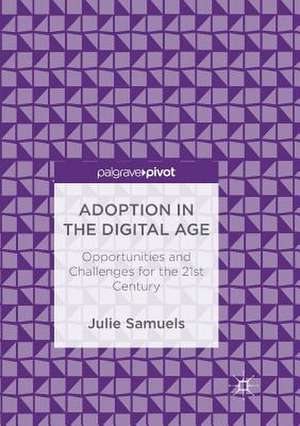Adoption in the Digital Age: Opportunities and Challenges for the 21st Century
Autor Julie Samuelsen Limba Engleză Paperback – 4 iun 2019
Combining both theoretical discussions with the human experience of adoption, Adoption in the Digital Age will be of interest to students and scholars across a range of disciplines, including sociology, social work and cultural studies, as well as practitioners working with adoptive families and other members of the adoption triad connected and disconnected by adoption.
| Toate formatele și edițiile | Preț | Express |
|---|---|---|
| Paperback (1) | 373.35 lei 6-8 săpt. | |
| Springer International Publishing – 4 iun 2019 | 373.35 lei 6-8 săpt. | |
| Hardback (1) | 379.39 lei 6-8 săpt. | |
| Springer International Publishing – 23 feb 2018 | 379.39 lei 6-8 săpt. |
Preț: 373.35 lei
Nou
Puncte Express: 560
Preț estimativ în valută:
71.49€ • 73.74$ • 59.25£
71.49€ • 73.74$ • 59.25£
Carte tipărită la comandă
Livrare economică 20 februarie-06 martie
Preluare comenzi: 021 569.72.76
Specificații
ISBN-13: 9783319889337
ISBN-10: 3319889338
Pagini: 167
Ilustrații: V, 167 p.
Dimensiuni: 148 x 210 mm
Greutate: 0.22 kg
Ediția:Softcover reprint of the original 1st ed. 2018
Editura: Springer International Publishing
Colecția Palgrave Macmillan
Locul publicării:Cham, Switzerland
ISBN-10: 3319889338
Pagini: 167
Ilustrații: V, 167 p.
Dimensiuni: 148 x 210 mm
Greutate: 0.22 kg
Ediția:Softcover reprint of the original 1st ed. 2018
Editura: Springer International Publishing
Colecția Palgrave Macmillan
Locul publicării:Cham, Switzerland
Cuprins
1. Introduction.- 2. Adoption in the Digital Age.- 3. Popular Media Representations of Adoption in the Digital Age.- 4. Adoption: Search and Reunification in the Digital Age.- 5. Further Openness in Adoption?.- 6. Conclusion.
Notă biografică
Julie Samuels is an independent researcher with a background in digital media, in both industry and the higher education sector.
Textul de pe ultima copertă
Adoption in the Digital Age explores the transformation of adoption due to social and digital media technologies. The most prolific of these changes can be seen within contact arrangements, particularly those that are not managed by an intermediary, between adopted minors and their biological kin. Within this shift, it becomes clear that this often-breached contact arrangement lends itself towards discussions about further openness within adoption. At the same time these technologies continue to document the way adopted individuals and their biological kin feel about themselves and each other. It is for these reasons that the Internet remains both a promise and threat. Samuels explores this in detail, highlighting that what it means to be adopted continues to evolve in the context of networked media cultures.
Combining both theoretical discussions with the human experience of adoption, Adoption in the Digital Age will be of interest to students and scholars across a range of disciplines, including sociology, social work and cultural studies, as well as practitioners working with adoptive families and other members of the adoption triad connected and disconnected by adoption.
Combining both theoretical discussions with the human experience of adoption, Adoption in the Digital Age will be of interest to students and scholars across a range of disciplines, including sociology, social work and cultural studies, as well as practitioners working with adoptive families and other members of the adoption triad connected and disconnected by adoption.
Caracteristici
Examines emerging tensions as a result of the use of social media in adoptive families in the UK, US and across the world Analyses the use of popular media and as a narrative tool Assesses the implications for family policy and social work practice
